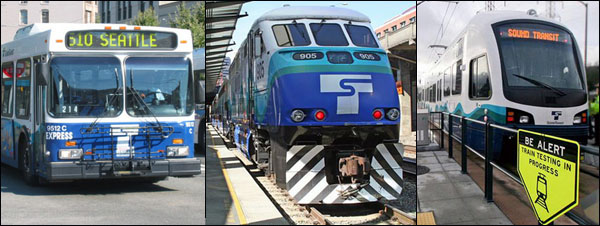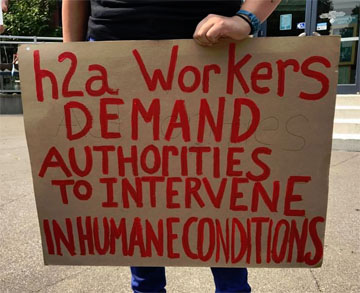NEWS ROUNDUP
Fund for ironworkers’ families ● H-2A oversight ● Millennial pessimism
Thursday, May 23, 2019
LOCAL
 ► In the NW Labor Press — Donations pouring in for the families of ironworkers killed in Seattle crane collapse — More than $128,000 has been donated to the families of two ironworkers killed in an April 27 tower crane collapse in downtown Seattle. The mishap took the lives of Travis Corbet, a member of Portland Iron Workers Local 29, and Andrew Yoder (pictured here with his family), a member of Seattle Iron Workers Local 86. Following the accident, Ironworkers USA Credit Union set up a donation account to assist the families. Ironworkers USA Credit Union will continue to accept donations to assist the Corbet and Yoder families. Contribute online here or call 1-877-769-4766.
► In the NW Labor Press — Donations pouring in for the families of ironworkers killed in Seattle crane collapse — More than $128,000 has been donated to the families of two ironworkers killed in an April 27 tower crane collapse in downtown Seattle. The mishap took the lives of Travis Corbet, a member of Portland Iron Workers Local 29, and Andrew Yoder (pictured here with his family), a member of Seattle Iron Workers Local 86. Following the accident, Ironworkers USA Credit Union set up a donation account to assist the families. Ironworkers USA Credit Union will continue to accept donations to assist the Corbet and Yoder families. Contribute online here or call 1-877-769-4766.
► In today’s Columbian — Clark College to cut 3 programs — Clark College will eliminate three programs in the midst of ongoing budget cuts, issuing notice to eight employees Wednesday that their jobs will be eliminated… Expected budget cuts come in the midst of bargaining with the Clark College Association for Higher Education, the first time the community college has bargained over salaries with the union. At a heated board of trustees meeting, union employees say the college is using scare tactics in order to tamp down on bargaining. Gerard Smith, a faculty member in the English department, said staff are “as upset as I have ever seen them in the last 28 years.”
► From KNKX — Workforce development to focus on underserved communities, local officials say — The high-paying jobs in the Puget Sound region can seem out of reach for a lot of people. Officials from King County and the City of Seattle say they want job training to benefit people who have been left behind as the local economy has grown.

► From Politico Magazine — Has Seattle found the solution to driving alone to work? — Three years ago, this fast-growing, hilly city of 725,000 people took a huge leap toward a longtime civic dream: becoming a place where it’s easy to live without driving every day or without owning a car at all. The results of its Link light-rail project, the latest in a long string of mass-transit investments, have been remarkable, and Seattle loves to tout them: As the city has grown in population, adding jobs and buildings, its car traffic has actually gone down. As other cities experiment with congestion pricing in their business districts and even banning cars from major thoroughfares, Seattle is trying another strategy: investing in more commuting options to take the pressure off its roadways.
EDITOR’S NOTE — But if Tim Eyman’s I-976 passes this fall, the Puget Sound region will take a giant step backward.
THIS WASHINGTON
 ► In today’s Yakima H-R — Governor signs bill increasing state H-2A oversight — The law creates the Office of Agricultural and Seasonal Workforce Services within the state Employment Security Department and sets up an advisory committee with people representing farmworkers and agricultural employers to address H-2A issues. The H-2A program allows agricultural employers to hire temporary foreign workers when there aren’t enough U.S. workers able, willing and available to do needed work. Employers must meet specific requirements, including pay, housing and transportation.
► In today’s Yakima H-R — Governor signs bill increasing state H-2A oversight — The law creates the Office of Agricultural and Seasonal Workforce Services within the state Employment Security Department and sets up an advisory committee with people representing farmworkers and agricultural employers to address H-2A issues. The H-2A program allows agricultural employers to hire temporary foreign workers when there aren’t enough U.S. workers able, willing and available to do needed work. Employers must meet specific requirements, including pay, housing and transportation.
► In today’s (Everett) Herald — Pow! Bam! Inslee delivers a one-two punch of executive power (by Jerry Cornfield) — First, he vetoed a sentence repeated in six successive sections of the transportation budget, each time poisoning a different bucket of money for transit. Then, he ordered $175 million be shifted from five highway projects to removing and replacing culverts impeding the passage of salmon to spawning grounds, and fish to the ocean.
► From Crosscut — WA cities will get ‘free money’ from the state for affordable housing — A new fund will let cities and counties keep $51M in sales tax revenue for low-income housing construction and maintenance.
► From the AP — Washington joins West Coast bloc of sanctuary states — Washington has become the latest West Coast state to enact broad sanctuary protections that restrict all local authorities from asking about people’s immigration status.
SOUTH OF THE BORDER
 ► From the NW Labor Press — Oregon teachers walk out for better school funding… and get it — More than 20,000 Oregon teachers took part in a one-day walkout May 8 to demand better school funding. Joined by parents and students, they rallied 25,000-strong in Portland, 3,000-strong in Salem, 2,000-strong in Bend, and 1,100-strong in Eugene. The day of action was meant to support HH 3427, which will raise $1 billion a year for school funding through a 0.57 percent gross receipts tax on Oregon businesses with more than $1 million a year in sales.
► From the NW Labor Press — Oregon teachers walk out for better school funding… and get it — More than 20,000 Oregon teachers took part in a one-day walkout May 8 to demand better school funding. Joined by parents and students, they rallied 25,000-strong in Portland, 3,000-strong in Salem, 2,000-strong in Bend, and 1,100-strong in Eugene. The day of action was meant to support HH 3427, which will raise $1 billion a year for school funding through a 0.57 percent gross receipts tax on Oregon businesses with more than $1 million a year in sales.
► In the NW Labor Press — New Seasons Market paid a union-buster a third of a million dollars — We finally know how much New Seasons Market spent to talk its employees out of unionizing: $325,855. A group of New Seasons employees in Oregon — working with UFCW Local 555 — had announced a union campaign at the company on Nov. 1, 2017. Within weeks, union-busting consultants were in stores talking to workers… New Seasons presents a public image as a progressive grocer, but hiring the California-based union-avoidance consultancy Cruz & Associates puts it in the company of some of the most anti-union corporations in America.
BOEING
► In today’s Seattle Times — FAA head says Boeing 737 MAX will return to flight, but timetable is uncertain — “It takes as long as it takes,” said Acting FAA Administrator Dan Elwell. “The 737 MAX will fly again when we have gone through all of the necessary analysis to determine that it is safe to do so… If it takes a year to find everything we need to give us confidence to lift the order, then so be it,” he added. “I’m not tied to a timeline.”
► In today’s Seattle Times — Top executive at Boeing’s troubled South Carolina plant is out — David Carbon, the executive in charge of Boeing’s troubled 787 factory in North Charleston, S.C., is leaving the company, according to an internal company memo. His departure comes about a month after The New York Times published an article detailing shoddy production practices and weak oversight at the factory.
THAT WASHINGTON
► From Politico — Infrastructure Week dies — again — Hopes for a grand $2 trillion infrastructure deal were rapidly vanishing even before Wednesday’s White House meeting between Trump and congressional Democrats blew up in a cloud of recriminations. One big reason: Neither party has offered a serious way to pay for one.
► In today’s Spokesman-Review — Murray says Trump’s action on infrastructure shows he’s in midst of tantrum; Newhouse blames Democrats for ‘partisan attacks’
 ► From Reuters — NLRB hints new rules on grad-student organizing, unions’ access to private property to come — The National Labor Relations Board will soon propose rules that could restrict union organizers’ access to companies’ private property, limit the ability of graduate students to unionize, and make it more difficult for unions to block decertification bids by workers, according to a policy agenda released on Wednesday.
► From Reuters — NLRB hints new rules on grad-student organizing, unions’ access to private property to come — The National Labor Relations Board will soon propose rules that could restrict union organizers’ access to companies’ private property, limit the ability of graduate students to unionize, and make it more difficult for unions to block decertification bids by workers, according to a policy agenda released on Wednesday.
► A related story in the Star-Tribune — Union files for new vote at Volkswagen’s Tennessee plant — The United Auto Workers union filed a new petition Wednesday seeking to hold a vote on its representation of workers at a Tennessee Volkswagen plant, the same day the NLRB dismissed a previous petition on a technicality.
 ► In today’s Washington Post — A 3-year-old touched a Harriet Tubman mural. Now, she’ll wait a decade to touch a $20 Tubman bill. — The abolitionist’s outstretched arm invites the viewer to join her on a journey to freedom. A 3-year-old girl on the Eastern Shore of Maryland became a sensation on social media this week after her grandmother, a local shopkeeper, posted a photograph of her reaching out to accept the invitation… Under plans unveiled three years ago by President Barack Obama’s treasury secretary, Jacob J. Lew, Lovie would have encountered Tubman’s visage each time she caught a glimpse of a $20 bill. Now, she will be in her teens before she handles a note bearing Tubman’s face. Plans to redraw the currency, replacing the slaveholding president Andrew Jackson with the abolitionist leader, are being put off until at least 2026, Treasury Secretary Steven Mnuchin announced on Wednesday.
► In today’s Washington Post — A 3-year-old touched a Harriet Tubman mural. Now, she’ll wait a decade to touch a $20 Tubman bill. — The abolitionist’s outstretched arm invites the viewer to join her on a journey to freedom. A 3-year-old girl on the Eastern Shore of Maryland became a sensation on social media this week after her grandmother, a local shopkeeper, posted a photograph of her reaching out to accept the invitation… Under plans unveiled three years ago by President Barack Obama’s treasury secretary, Jacob J. Lew, Lovie would have encountered Tubman’s visage each time she caught a glimpse of a $20 bill. Now, she will be in her teens before she handles a note bearing Tubman’s face. Plans to redraw the currency, replacing the slaveholding president Andrew Jackson with the abolitionist leader, are being put off until at least 2026, Treasury Secretary Steven Mnuchin announced on Wednesday.
NATIONAL
► In the Baltimore Sun — Johns Hopkins should stop suing poor people (editorial) — Johns Hopkins Hospital is under a harsh spotlight again for taking some of its poorest and most vulnerable patients to court over $4.8 million in unpaid medical bills since 2009. A new analysis by the AFL-CIO, National Nurses United and the Coalition for a Humane Hopkins has found the medical system is targeting people with limited means even more aggressively than in the past… The hospital should cease this practice until they come up with a better way to measure whether a patient can truly afford to pay.
TODAY’S MUST-READ
 ► From Reuters — Why pessimism on Social Security could come back to bite millennials (by Mark Miller) — Many young people have been conditioned to think they should not count on Social Security to be there when their time to retire rolls around. That is not surprising, considering the negative, often false propaganda uttered by politicians hostile to Social Security and the financial services industry, and misleading media coverage. The danger here is that the current high level of worry over Social Security’s viability could become self-fulfilling if it erodes political support…
► From Reuters — Why pessimism on Social Security could come back to bite millennials (by Mark Miller) — Many young people have been conditioned to think they should not count on Social Security to be there when their time to retire rolls around. That is not surprising, considering the negative, often false propaganda uttered by politicians hostile to Social Security and the financial services industry, and misleading media coverage. The danger here is that the current high level of worry over Social Security’s viability could become self-fulfilling if it erodes political support…
“Social Security is the most successful anti-poverty policy in the history of the United States,” said Peter Arno, an economist at the University of Massachusetts-Amherst. “And this is not true just for seniors, but across the entire life cycle and the entire population. It reduces more poverty for children than any other policy, more poverty for working adults and more poverty for seniors. So it’s an intergenerational antipoverty program.”
ALSO at The Stand — Beware this sneak attack on Social Security (by Nancy Altman) — “Chained CPI” might sound technical and boring, but anyone who has closely followed the Social Security debate knows better. It has long been proposed as a deceptive, hard-to-understand way to cut our earned Social Security benefits.
The Stand posts links to Washington state and national news of interest every weekday morning by 10 a.m.





